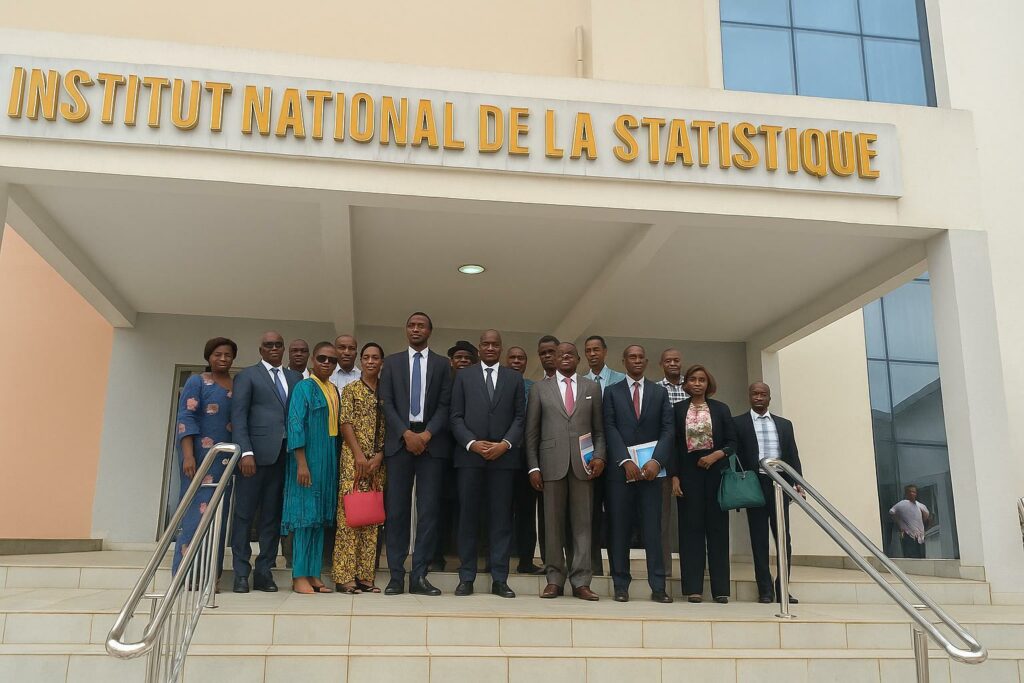Historic dialogue between statisticians and industry
In an airy conference hall on the banks of the Congo River, executives from the country’s major factories sat shoulder to shoulder with economists of the National Institute of Statistics (INS). The gathering, held in Brazzaville, marked the first formal exchange devoted entirely to revising two cornerstones of the national economic dashboard: the Industrial Production Index (IPI) and the Industrial Producer Price Index (IPPI). INS Director-General Stève Bertrand Mboko Ibara set the tone at the outset, underscoring that high-quality statistics are not an academic luxury, but a decisive lever for business performance and public stewardship. “Your active participation in data collection will guarantee the credibility and representativeness of the new indices,” he urged, inviting companies to move from passive data providers to genuine partners in the statistical chain.
Why the indices matter for Congo-Brazzaville
The IPI records the real-time pulse of industrial output, while the IPPI captures price movements at the factory gate. Together, they offer a panoramic view of supply-side dynamics, cost pressures and competitiveness in the Congolese economy. By opening the black box of production volumes and producer prices, policymakers can calibrate fiscal measures, and firms can benchmark their performance against sectoral trends. Until now, however, methodological gaps risked blurring the true trajectory of these indicators. Aligning the calculation protocols with international standards is therefore more than a technical upgrade; it is a prerequisite for integrating Congo-Brazzaville into global analytic comparisons.
Modernisation goals and expected benefits
According to Fatoumata Diallo, head of short-term analysis at the INS, the re-engineering exercise aims to generate “more reliable and representative data, useful both for the State and for businesses.” The forthcoming basket of enterprises that feed into the indices will better mirror the diversity of the national industrial fabric, from extractive ventures to agri-food processors. On the methodological front, updated sampling, seasonal adjustment and deflation techniques will strengthen the indices’ sensitivity to real-world fluctuations. For the private sector, sharper indicators translate into timelier insights on market demand and cost structures; for the government, they underpin sound budget planning and evidence-based policy evaluation.
Safeguarding confidentiality and building trust
Recognising perennial concerns over commercial secrecy, the INS reiterated that all information collected will be used exclusively for statistical purposes. Aggregate publication, anonymisation and secure data handling were highlighted as non-negotiable safeguards. This reassurance struck a chord with corporate participants, who acknowledged that without trust, even the most sophisticated statistical toolkit would remain under-fed. The Institute’s pledge is expected to reduce reporting reluctance and encourage fuller disclosure, further enhancing the robustness of the indices.
Timeline and next steps for implementation
While the precise rollout calendar is still under discussion, the working session mapped out a phased approach: finalisation of methodological guidelines, pilot testing with a representative panel of firms, and gradual extension to the full industrial universe. Feedback loops will be institutionalised so that companies can signal operational difficulties and the INS can adjust questionnaires in real time. Participants voiced optimism that the modernised IPI and IPPI could be disseminated within the next statistical year, offering fresh granularity for both quarterly reviews and long-term investment strategies.
À retenir
The Brazzaville consultation has cemented an unprecedented partnership between statisticians and industrialists. By unifying efforts to revise the IPI and IPPI, Congo-Brazzaville positions itself to deliver economic indicators that are both internationally comparable and finely attuned to local realities. The credibility of the future indices will hinge on sustained data sharing and the INS’s vigilance in protecting confidentiality.
Le point économique
The reform carries potential macroeconomic dividends. Enhanced measurement of output and producer prices will refine GDP estimation, sharpen inflation diagnostics and deepen the evidence base for industrial policy. On the microeconomic front, firms stand to benefit from benchmarking tools that illuminate productivity gaps and input-cost trends. In a context where diversification of the economy is a national priority, the modernised indices could become a compass for both public and private decision-makers.

